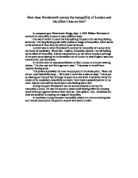Wordsworth’s aim was to make poetry accessible to everyone, every class and every individual in society. He does this by using nature, as nature is available to everyone. In addition, nature creates an insight into the human mind, ‘one moment now may give us more than fifty years of reason’. Hence, he explores knowledge and wisdom in nature, as he believes it’s all around us. Therefore, against or with your will one is learning all the time.
Nature is portrayed as powerful and ‘good’, whereas man is the opposite. In ‘Lines Written in Early Spring’ personification is the most common of literary devices used. Examples of this are shown when he writes: "And 'tis my faith that every flower Enjoys the air it breathes". He is giving a flower the human characteristic of enjoying the air it "breathes". Another example of personifying nature in this poem is when Wordsworth writes: "The budding twigs spread out their fan, To catch the breezy air". He also explores the relationship nature has with man, as shown in the ‘bower’ and the ‘grove’ - where nature and man are in harmony. By building an emotionally sensitive atmosphere, Wordsworth describes the light hearted scene of an open glade and uses this setting as the basis of a comparison between the natural world and the unnatural “civilized” world. Wordsworth, in writing “Lines Written in Early Spring”, one of his first in a life’s work of Romantic poetry, speaks of a wayward spiritual digression that mankind has brought upon itself. Wordsworth’s “Lines Written in Early Spring” is a wonderful work of peaceful natural contemplation, but sadly it finds itself a reverie in a dynamic of natural grace and a lamentation for how far man has displaced himself from it; his repeated lines of “What man has made of man”.
It is the second stanza of the poem that the audiences are given the theme of the poem when Wordsworth writes “And much it grieved my heart to think / What man has made of man.” Wordsworth, in his reflection of “What man has made of man”, is describing how mankind, though civilized, has an innate spiritual connection to “Nature” and “her fair works”. Essentially, Wordsworth’s “Lines Written in Early Spring” revolves around this Romantic theme of how beautiful and essential our intrinsic connection to nature is, and how unfortunate and painful our self-inflicted disconnection has become. Wordsworth writes of how nature offers a wholesome and natural lifestyle that he feels has been lost to the pointlessness and monotonous of civilization and the pursuit of contemporary capitalistic gain. It was also two years before the turn of the century, so perhaps he was calling for change, by breaking literary tradition and starting something brand new and conventional, by commanding all people to ‘quit your books’ and ‘let nature be your teacher’ s there is so much ‘more of wisdom in it.’
Wordsworth's critical ideas are manifested in his writing. He uses the language and subjects of the common man to convey his ideas. As he writes in "The Tables Turned," "One impulse from a vernal wood / May teach you more of man, / Of moral evil and of good, / than all the sages can". These lines show that Wordsworth places little stock in the benefit of education or institutionalized wisdom. He implies that any person with exposure to Nature can learn the secrets of the world, regardless of social or economic considerations.
Wordsworth explores ‘knowledge’ by presenting poems with dialogue, consisting of two world views (a dichotomy). There is a speaker, who asks the questions, and a representative of Wordsworth’s views. Throughout the poems he develops his ideas by answering the speaker’s questions, and by doing so the audiences are being taught morals to live by. ‘Bring with you a heart that watches and receives’. Wordsworth wants people to stop thinking and start feeling, to accept things and ‘enjoy’ the more ‘important’ things in life.
Wordsworth explores nature using key images, by portraying it as powerful, God-like, teaching and protective - ‘mother earth’ and personifies it - ‘‘her fair works did Nature link/The human soul that through me ran”, Wordsworth describes how the human soul has been emotionally linked to the works of “Nature”. He portrays Nature as a person, a divine female, a natural force that, though perhaps not usurping God’s role in Creation, still plays a direct role in the conception of human nature. Humanity, Wordsworth would have believed, however far it removes itself from the natural world, can never cut the connection that it shares with natural life, scenery, and beauty. Wordsworth has successfully captured one of the greatest themes of Romanticism: that humanity, how far it attempts to distance itself from the natural world through its “civilization”, is still, and will always be, a part of nature.
Indeed, Wordsworth is continually inspired and led into transcendent moments by his experiences in Nature. These experiences bring to his mind a wide variety of contemplations and considerations that can only be expressed, as he writes in "Expostulation and Reply," in "a wise passiveness". This poem compares Nature with what man makes (Science, Books, "Knowledge", and Art). The last two stanzas criticise those who attempt to explain and overanalyse the world, destroy the beauty in nature when doing so - "We murder to dissect." Instead we should just observe life around us, accept it, and feed our minds in a "wise passiveness."








